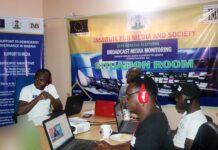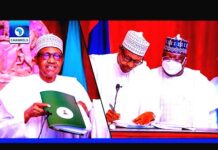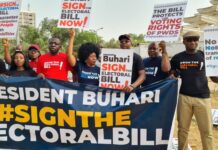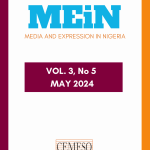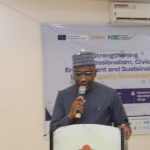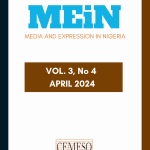In its editorial of July 22, 2018, the paper gave detailed analysis of what the money is to be spent on in prosecuting the elections in all of 21 days. According to the paper, the money would be spent as follows:
* Civil Defence, N3.7 million to feed dogs and horses;
* Immigration, N126 million to print name tags for its officials, etc;
* Nigeria police, N30 billion;
* DSS, N12 billion; N2 billion ‘for localised elections and travel allowances;
* Nigerian Security and Civil Defence Corps, N3.5 billion;
* NSA: N4 billion;
* Post-election investigation, N100 million.
Take a breath.
I am relying on the analysis by the paper to make my comments. The first point to note is that no one ever said that democratic elections were cheap. If they are in other countries, certainly not in the giant of Africa with deep pockets, thanks to crude oil. Still, I could not help chuckling over the N3.7 million requested for the feeding of dogs and horses for 21 days. I do not know how many of these faithful animals would be pressed into service during the period but it would seem that given the importance we attach to our elections, their handlers rightly thought it would not be out of place to place them on special diets such as caviar and chicken peri-peri. Buhari agreed with them. Well-fed dogs and horses do make for free and fair elections. You do not have to wait for Godot to confirm that. Just live to February, 2019.
These handsome itemised allocations do not give us the full picture of what it costs the nation and individuals to distribute power and grab power respectively. The INEC budget for the elections is something rather piddling (compared to what the police requires for 21 days) like N300 million. Anyone seeking full information on our electoral expenses hits the brick wall. It is as opaque as the NNPC annual budget. But the facts of our elections being expensive are not guess work.
The second point to note is the apparent willingness of the Nigerian state to spare no expenses to give itself free and fair elections. This is good. If all it takes is more money for the police to deploy its personnel to police polling stations, so be it. If their presence does not prevent ballot snatching and cash-for-votes, you know it is not really their fault; it is just the way the electoral wind blows.
The two points boil down to the third, namely, the rising cost of our elections. In a special investigative report on this published by the Daily Trust of May 7 this year, the paper established the following facts:
The cost of our elections has been steadily rising since 1999. That year, the much heralded elections that concluded the transition to civil rule programme, cost us a “little above N1 billion” to replace khaki with agbada. It soon soared into the stratosphere with “over N100 billion in 2015.”
Whereas Nigeria with 67 million registered voters spent $625million in 2015, India with 815 million registered voters spent $600 million on its 2014 general elections.
Nigeria spends much more on elections than Canada, the United Kingdom and Australia.
Comparison with Canada, the UK and Australia might be slightly misleading because they are settled democracies and no longer grapple with the basic infrastructural and logistical challenges of conducting elections like we do. However, the point here is we choose not to put in place the infrastructures that should conduct our national elections without breaking the treasury.
There is a huge irony here. In the natural order of things, the more money we spend on our elections the greater the dividends we should reap as a nation. With that kind of money, we should conduct free and fair elections hailed by the international community for their integrity. But the more we spend, the more problematic our elections become: ballot box snatching, under age voting and cash for votes. The more we spend on our elections the more we tend to put men and women with two left hands in the executive and the legislative branches of government. This is not in the natural order of things. The result is poor governance, open stealing with impunity and chaos in our legislative chambers.
Here is a nagging question. What makes the printing of name tags for officials of the Nigerian Immigration Service so important to the conduct of the general elections? I must be missing something otherwise why would Buhari, not known to act Chief Moshood Abiola in any way, accede to this demand?
Election times are routine black mail times too by all those connected with ensuring that they are free and fair. And they are chop-chop times too. More money is pocketed than is spent on prosecuting and policing the elections. Indeed, stories that the security agents are complicit in election rigging are not, to borrow the language of undergraduates, fabu. That they are easily compromised does not blow in the wind. They see dangers every where. So it is easy for the police chief to insist that he needs N30 billion for his men and women to police the elections and the president, for fear of being blamed for his tight-fistedness, would easily approve. He is an interested party too, after all.
You see, in every election in the country, be it general or bye-election, the police and the other security agencies have always been financially catered for. But think back on the history of our elections, all of which were and are routinely and hotly disputed for alleged rigging. Our elections excite global interests for the wrong reasons. They have become sources of mounting concern to the rest of the world.
We cannot continue to let the cost of our elections go up and the returns go down. It is not that difficult to arrest this dangerous drift. I offer two suggestions. One, we must devise a formula to place a ceiling on the cost of our elections. I suggest we take the cost of the previous elections as a bench mark. We can then add ten or twenty per cent to that to arrive at a reasonable cost of the current election.
Two, the agencies given money for the prosecution of elections must each account for what it received. It is wrong to treat elections expenses as routine security expenses that are not required to be accounted for. Two months or so after the elections, there must be a proper audit report on who or what agencies received what from the generous vote on election expenses.
Sure, they will lie and fudge as civil servants are known to do in retiring touring advances. These suggestions might not necessarily stop the obvious corruption in the system fired by the once in a lifetime opportunity to feed well at the expense of the Nigerian state in an election season. But it makes sense to institute a system that forces people to take responsibilities for what they do to their own country.
The Guardian rightly pointed out that “elections can be very expensive, especially in a presidential system of government. But it does not have to be this expensive.” Yes. Nigeria does not have to take unmerited pride in being the country with the most expensive elections in the world. Let us grow our democracy with a sense of responsibility. If lavish spending on elections makes them free, fair and respectable, we would have known that by now.




